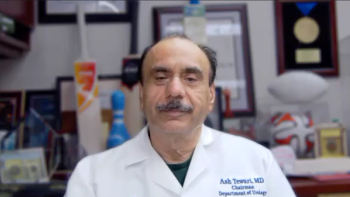
ACA Reduced Number of Uninsured Diagnosed With Testicular Cancer
Fewer patients diagnosed with testicular cancer were uninsured, and fewer were diagnosed with late-stage disease, following the Affordable Care Act’s Medicaid enrollment expansion.
Fewer patients diagnosed with testicular cancer were uninsured, and fewer were diagnosed with late-stage disease, following the Affordable Care Act (ACA)’s Medicaid enrollment expansion, according to research presented (
Medicaid expansion was also followed by a shift toward diagnosis at earlier stages of testicular cancer, without changing patterns of disease management, reported lead study author Xinglei Shen, MD, of the University of Kansas Medical Center in Kansas City, and colleagues.
Starting in 2014, the ACA expanded eligibility for the government-sponsored Medicaid insurance program. Because testicular cancer tends to be diagnosed early in life, younger patients might “derive particular benefit” from the Medicaid expansion effort, Dr. Shen and coauthors reasoned.
The researchers performed a population-based analysis of insurance status and treatment trends before and after the Medicaid expansion, using US National Cancer Institute Surveillance, Epidemiology, and End Results (SEER) data. Men diagnosed during 2010–2013 were treated as a baseline cohort and those diagnosed in 2014 were treated as the Medicaid expansion cohort.
For the 2014 data, SEER regions were stratified by states that participated in the Medicaid expansion effort and four (Alaska, Georgia, Louisiana, and Utah) that did not. Patient age, rural vs urban residence, race/ethnicity, and marital status were also collected for analysis.
The percent change in new diagnoses from baseline years to 2014 was 6.9% for Medicaid expansion states and 7.5% in non-expansion states.
The Medicaid expansion was associated with a halving of uninsured people in expansion states (8.8% during baseline years to 4.3% in 2014; P < .01), but not in non-expansion states (13.7% to 12.9%, P = .68).
The percent increase in states’ Medicaid enrollment correlated with decreased proportions of men diagnosed with testicular cancer who were uninsured.
Medicaid expansion also appears to have improved rates of early-stage detection and to have reduced late-stage diagnoses. Among Medicaid patients in expansion states there was an increase in stage I testicular cancer diagnoses (52% to 60%) and a decrease in stage III cancer diagnoses (27% to 20%).
Newsletter
Stay up to date on recent advances in the multidisciplinary approach to cancer.




































